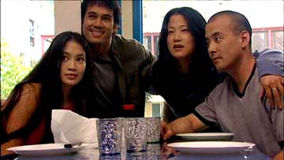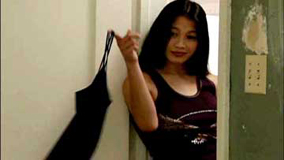|
Newest Reviews:
New Movies -
The Tunnel
V/H/S
The Tall Man
Mama Africa
Detention
Brake
Ted
Tomboy
Brownian Movement
Last Ride
[Rec]≥: Genesis
Hara-Kiri: Death of a Samurai
Indie Game: The Movie
Abraham Lincoln: Vampire Hunter
Old Movies -
Touki Bouki: The Journey of the Hyena
Drums Along the Mohawk
The Chase
The Heiress
Show
People
The Strange Affair of Uncle Harry
Pitfall
Driftwood
Miracle Mile
The Great Flamarion
Dark Habits
Archives -
Recap: 2000,
2001, 2002,
2003, 2004
, 2005, 2006,
2007 , 2008
, 2009 ,
2010 , 2011 ,
2012
All reviews alphabetically
All reviews by star rating
All reviews by release year
Masterpieces
Screening Log
Links
FAQ
E-mail me
HOME
| |
Charlotte Sometimes (Eric Byler, 2002)
 Charlotte Sometimes, the debut feature from director Eric Byler, features
plenty of hushed moments that suggest the presence of nuances that never really
emerge from its murky tone. Telling a modest tale about romantic obsession and
disappointment, it is pitched low enough that its error never seem truly
disastrous, but it definitely has the feel of a first feature. There are rough
edges everywhere, and it assumes profundity more often than it demonstrates it.
For every pause in the action that suggests maturity, thereís a gaffe that
shows us how much Byler still has to grow. For example, is there a more
simple-minded dysfunctional relationship in modern cinema than the one between
the characters Lori and Michael? During sex, she asks him to say ďI love
you,Ē and he asks her to say ďI hate you.Ē Their dynamic is so reductive
and obvious that itís amazing itís supposed to hold audience interest.
Throughout the first half of the film, Byler feels like heís building up to
something. It feels like it has something to say. Unfortunately, he ultimately
settles for melodrama instead of perceptiveness. It doesnít help matters that
the film features inadequate performances that mostly consist of actors averting
their eyes and shifting in their seats. When a film is dependent as this one on
characterization, it requires a firmer hold on its castís interior lives than
this one has.
Charlotte Sometimes, the debut feature from director Eric Byler, features
plenty of hushed moments that suggest the presence of nuances that never really
emerge from its murky tone. Telling a modest tale about romantic obsession and
disappointment, it is pitched low enough that its error never seem truly
disastrous, but it definitely has the feel of a first feature. There are rough
edges everywhere, and it assumes profundity more often than it demonstrates it.
For every pause in the action that suggests maturity, thereís a gaffe that
shows us how much Byler still has to grow. For example, is there a more
simple-minded dysfunctional relationship in modern cinema than the one between
the characters Lori and Michael? During sex, she asks him to say ďI love
you,Ē and he asks her to say ďI hate you.Ē Their dynamic is so reductive
and obvious that itís amazing itís supposed to hold audience interest.
Throughout the first half of the film, Byler feels like heís building up to
something. It feels like it has something to say. Unfortunately, he ultimately
settles for melodrama instead of perceptiveness. It doesnít help matters that
the film features inadequate performances that mostly consist of actors averting
their eyes and shifting in their seats. When a film is dependent as this one on
characterization, it requires a firmer hold on its castís interior lives than
this one has.
 The opening section of Charlotte
Sometimes stresses themes of disconnectedness and social alienation that one
would usually expect to find in a film that uses a style dominated by master
shots, but Byler shoots this film like a thriller. Midway through, the movie
becomes something that could be loosely defined as a thriller, and the
alienation shown takes place on a more personal level. The style begins to make
sense, but the change of priorities doesnít satisfy, since it largely leaves
the opening sectionís emotional concerns high and dry. The rather obvious
character and plot twists keep the movie from ever feeling either surprising or
deep. The soundtrack is far too dominant and haphazardly assembled for a movie
that is attempting to convey the mood of the characters specifically. The
unaccomplished DV photography rarely enlightens our understanding of the
characters. A shot that uses a mirror to show us two Charlottes at once is the
most obvious attempt possible, but itís the best the film really offers
besides alternating which character is standing in the shadows at a given time.
Since Byler doesnít really have any suspenseful set pieces lying in wait,
either, perhaps it would have been best if he had approximated the master-shot
style that other filmmakers have used with similar material (then again, maybe
his demonstrable lack of formal control should make us thankful he hasnít). A
wildly discordant tennis montage, which seems to have been ripped out of The
Witches of Eastwick, is completely
inexplicable on any terms. Though far from a disaster, Charlotte
Sometimes is more admirable for what it tries to do than for what it manages
to do. The opening section of Charlotte
Sometimes stresses themes of disconnectedness and social alienation that one
would usually expect to find in a film that uses a style dominated by master
shots, but Byler shoots this film like a thriller. Midway through, the movie
becomes something that could be loosely defined as a thriller, and the
alienation shown takes place on a more personal level. The style begins to make
sense, but the change of priorities doesnít satisfy, since it largely leaves
the opening sectionís emotional concerns high and dry. The rather obvious
character and plot twists keep the movie from ever feeling either surprising or
deep. The soundtrack is far too dominant and haphazardly assembled for a movie
that is attempting to convey the mood of the characters specifically. The
unaccomplished DV photography rarely enlightens our understanding of the
characters. A shot that uses a mirror to show us two Charlottes at once is the
most obvious attempt possible, but itís the best the film really offers
besides alternating which character is standing in the shadows at a given time.
Since Byler doesnít really have any suspenseful set pieces lying in wait,
either, perhaps it would have been best if he had approximated the master-shot
style that other filmmakers have used with similar material (then again, maybe
his demonstrable lack of formal control should make us thankful he hasnít). A
wildly discordant tennis montage, which seems to have been ripped out of The
Witches of Eastwick, is completely
inexplicable on any terms. Though far from a disaster, Charlotte
Sometimes is more admirable for what it tries to do than for what it manages
to do.
42
08-23-03
Jeremy Heilman
|